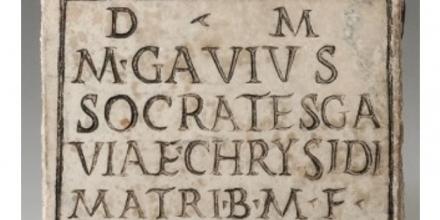
If you want to understand a culture, you need to understand its language. Latin was spoken by Romans drinking in the tavern, watching games in the arena, or debating politics in the senate house. It is the language of graffiti scrawled on walls in Pompeii, ribald love poetry, heroic epics, blistering courtroom speeches, and the fables of former slaves. In the centuries after the demise of the Roman Empire, Latin retained a central place as the language of European history, law, oratory, and science. At ANU, you will laugh, cry, cheer, and debate your way through Latin!
You will begin your Latin study with an introduction to the principles of language before moving on to detailed study of a wide variety of genres and authors from the Roman Republic to Late Antiquity. These will include writers such as the poets Virgil and Ovid, the orator Cicero, the Stoic philosopher Seneca the Younger, the Christian martyr Perpetua and the pilgrim Egeria, and a variety of texts and genres, from plays and poetry to histories and biographies. You will engage in close textual analysis and explore the literary, historical and cultural contexts in which Roman authors wrote. You will also explore the many different contexts in which Latin was used, from graffiti to funerary inscriptions, their accompanying styles and registers, and the manifestations of regional and chronological variation.
Proficiency in Latin is highly recommended if you wish to specialise in the study of Greece and Rome, medieval and early modern history, English literature, law, rhetoric, philosophy, politics and international relations, and archaeology. Studying Latin will enrich your understanding of the English language and other European languages which evolved from Latin, such as French, Italian, and Spanish.
No previous knowledge of Latin is required to take this major. You can commence with Introductory Latin and proceed all the way to Advanced Latin. If you have studied Latin at school or another institution, you can commence at the Intermediate or Advanced Level (students with Year 12 Latin should proceed directly into Advanced Latin).
Career Options
Classical Studies graduates have the ability to analyse, critique, and research history, literature, and culture. ANU Classics alumni have pursued successful national and international careers as: parliamentary advisors and researchers; senior officers at NGOs and think-tanks; strategists in the philanthropy sector; historians, curators, and conservators in libraries and museums; authors, editors, and translators in the publishing sector; teachers of Ancient and Modern History and Latin; university academics, administrators, and researchers in the fields of Classics, Music, Political Science, and Linguistics.